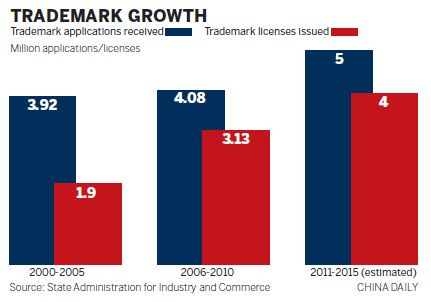Politics
Vow to boost overseas trademark protection
Updated: 2011-03-22 07:17
By Qiu Bo (China Daily)
|
 |
Beijing - China's top industry and commerce administrator has pledged that every effort will be made to protect trademarks registered by overseas firms amid a growing number of applications.
"Overseas firms are encouraged to report violations to us and we will take immediate action upon receiving the report," he told China Daily.
Commerce and industry authorities dealt with 265,000 such cases during the 11th Five-Year Plan (2006-2010) period, with about 20 percent, or 53,000 cases, concerning overseas firms, according to official statistics.
The number of foreign firms reporting trademark violations rose by 10 percent year-on-year to 11,524 in 2010.
|
 Zhou Bohua is minister of the State Administration for Industry and Commerce |
The SAIC handled 56,034 cases of trademark infringement worth 1.4 billion yuan ($210 million) in 2010 and 175 cases were submitted to judicial authorities, almost double the previous year's number.
In 2010, the Walt Disney Co won a lawsuit against a manufacturer of children's clothing in Shenzhen, Guangdong province, for using the world-famous "Mickey Mouse" image, winning 500,000 yuan in compensation.
Overseas companies and organizations have so far registered more than 500,000 trademarks in China, Zhou said.
Foreign firms seeking trademark licenses in China can opt for one of two routes.
They can submit applications through agencies or apply through the Madrid System for the International Registration of Marks - the primary system for registration in multiple jurisdictions throughout the world.
China has been a member of the system since 1989.
In 2010, overseas companies submitted 68,000 applications through agencies and 31,000 through the Madrid System.
The biggest number of applications came from the electronic and garment sectors, which accounted for 17 percent.
The United States, Japan and Germany were the top three countries for submissions, making up 50 percent of all applications.
The SAIC also sought international cooperation to prevent Chinese trademarks from being used by overseas companies, especially online through cybersquatting, Zhou said.
Cybersquatting involves using a domain name to profit from the goodwill of a trademark belonging to someone else.
Domestic companies submitted some 2,100 trademark applications through the Madrid System in 2010, half of which were from owners in Zhejiang and Guangdong provinces.
The SAIC wants to encourage Chinese companies to aim for 8,000 overseas applications in the next five years, Zhou said.
In the last three years the government has slashed the time it takes to get a trademark license from 36 months to 12 months.
Zhou said his administration will reduce this to 10 months in the next two years.
Wang Qian, a professor at the Intellectual Property School of East China University of Political Science and Law, said most Chinese companies have yet to grasp the importance of trademark registration and lag far behind their foreign competitors.
"That's a major reason why Chinese companies applied overseas far less than foreign companies did in China," Wang said.
Specials

Tea-ing up
More turning to Chinese tea for investment opportunities like vintage wine

A cut above
The ancient city of Luoyang is home to a treasure trove of cultural wonders.

Rise and shine
The Chinese solar energy industry is heating up following recent setbacks in the nuclear sector



